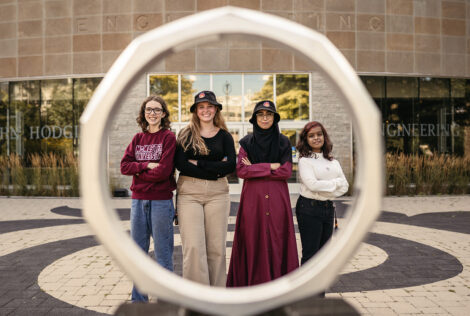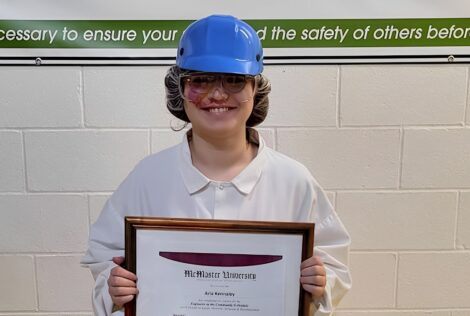
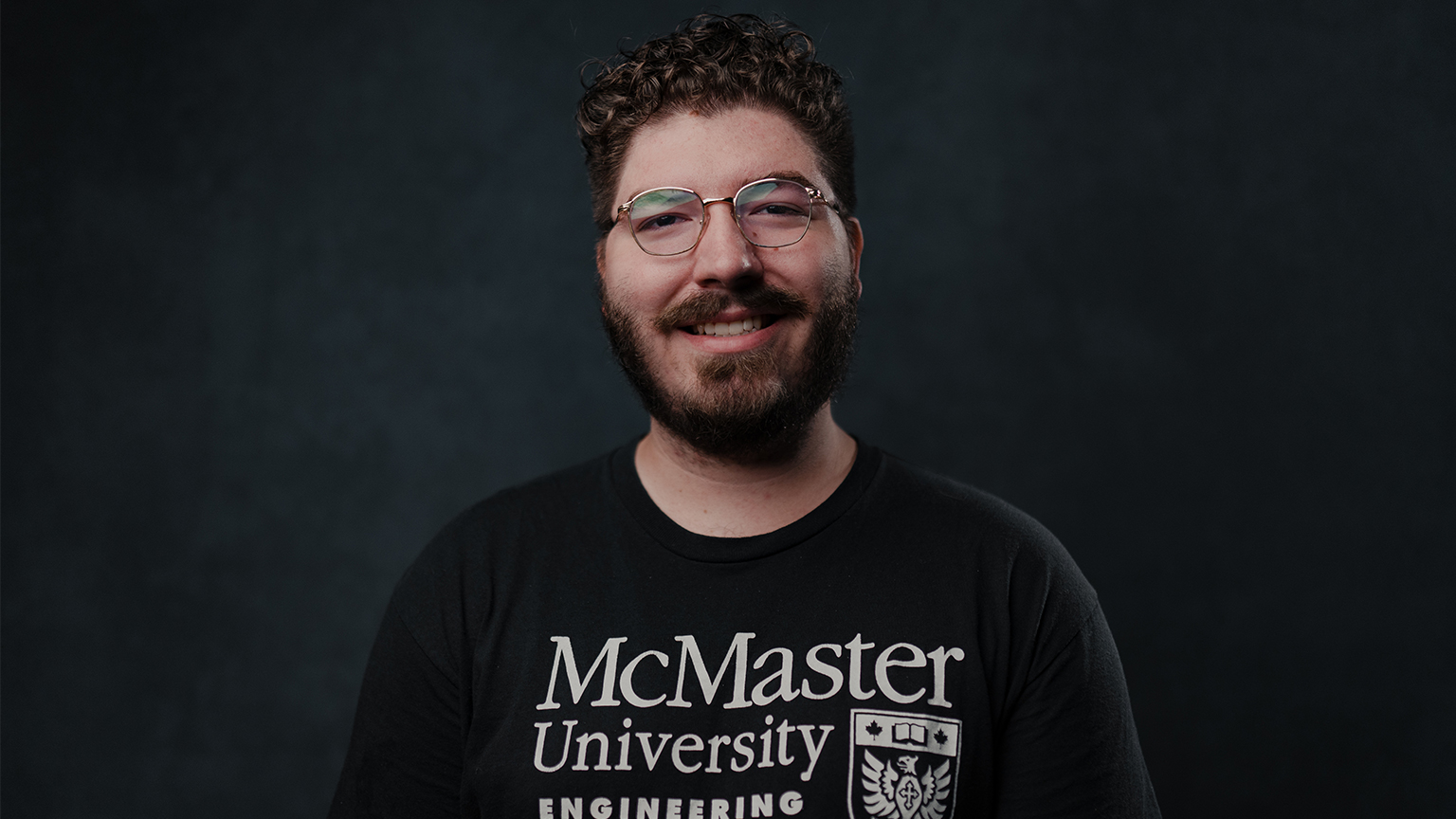
McMaster Engineering scholarship winners Halima Banuso, James LeMoine and Adekunle Omoniyi consider the importance of scholarships being available to diverse groups and what winning a scholarship means for them and future generations.
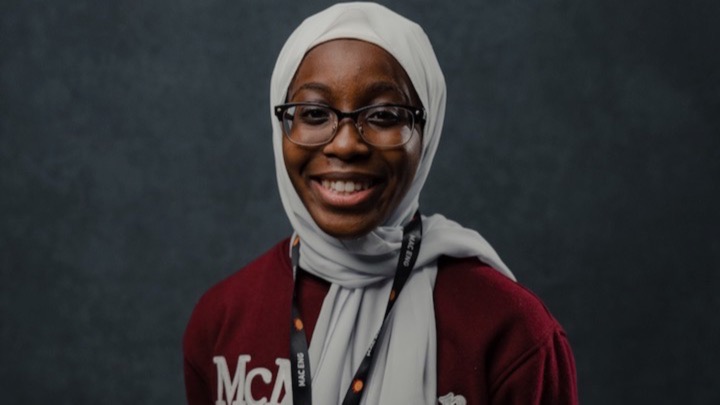
Halima Banuso
Engineering 1 student and Inaugural Winner of the National Society of Black Engineers (NSBE) McMaster Chapter Award
Q: Can you share your passions outside the classroom?
A: Outside of the classroom, I was always really interested in getting involved in school. I really liked planning events and helping run different social justice initiatives. Additionally, I volunteer with Starts With One Canada which focuses on equity and social justice in regards to the school system. Through my involvement at Starts With One Canada, I’ve learned how inequity in the school system affects marginalized students and that is why I have been passionate about helping Black students like myself explore their potential. I believe that something as small but also as big as someone’s race shouldn’t deter them from amazing opportunities.
Through my involvement at Starts With One Canada, I’ve learned how inequity in the school system affects marginalized students and that is why I have been passionate about helping Black students like myself explore their potential.
Q: Why does experiential learning matter?
A: Experiential learning is really important because in the workforce you are actually going to be doing hands-on work. It is important that you know how to apply the skills you learn in the classroom in an actual workplace setting. I’m really grateful that McMaster offers courses that give us the chance to be involved in this process which ultimately helps us be more successful after we graduate.
Q: How well do you think McMaster is supporting equity, diversity and inclusion (EDI) at McMaster and what else can we do to improve our efforts?
A: When I was applying to McMaster, something that I was really interested in was that McMaster offers both equity & diversity clubs and technical clubs. I know that aside from NSBE, there’s also Women in Engineering and Engiqueers. I also really appreciate that equity is also taken into consideration when it comes to our classes–making sure that even though there are less women in our courses, there is an equal amount of girls and guys in a group. They address these diversity concerns with us at the beginning of the year to ensure that we can avoid conflict when it comes to these topics as people are coming from different backgrounds. In short, I think McMaster is doing a good job of supporting equity, diversity, and inclusion. For the future, it really just comes down to speaking with students and hearing their lived experiences. Just being open to seeing how marginalized students are feeling can really ensure positive growth in terms of equity, diversity, and inclusion.
Just being open to seeing how marginalized students are feeling can really ensure positive growth in terms of equity, diversity, and inclusion.
You can read more about Halima and her journey to Mac by reading her Fireball Diaries blog post.
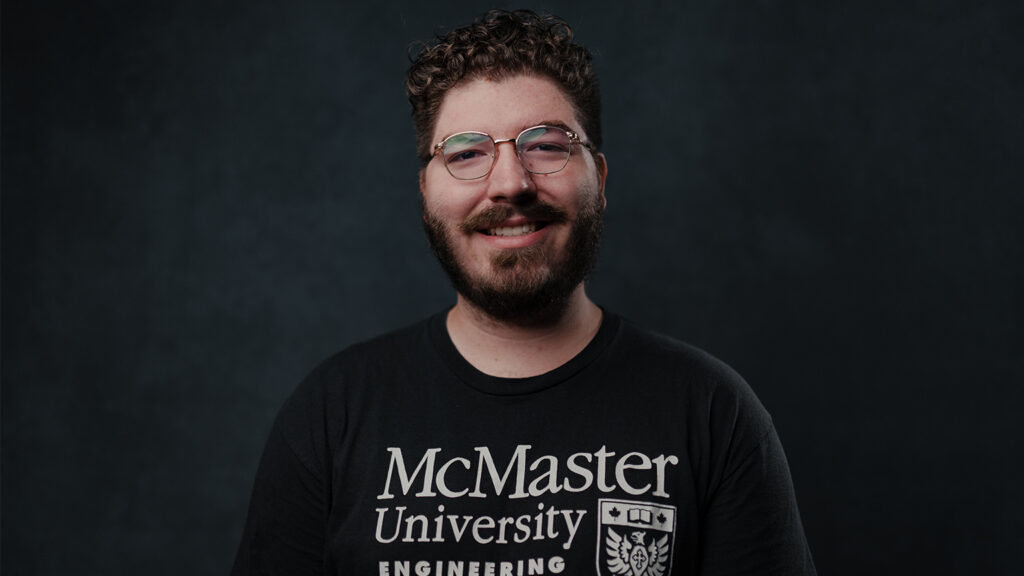
James LeMoine
Mechanical Engineering PhD Student and winner of the Indigenous and Black Engineering Technology (IBET) PhD Fellowship at McMaster
Q: How did you feel when you found out you won the fellowship? What does this award mean to you?
A: I was excited when I found out I won. It means a lot to be recognized as one of the minority groups here on campus. Going through my studies, I felt like the lone one out. All of my Indigenous friends–they never continued on to academia and those who did, did not choose STEM paths. It really felt isolating so seeing an award that aims to encourage more Indigenous people to follow the path really means a lot.
All of my Indigenous friends–they never continued on to academia and those who did, did not choose STEM paths. It really felt isolating so seeing an award that aims to encourage more Indigenous people to follow the path really means a lot.
Q: What is your research and why is it important?
A: My research is on electrohydrodynamics and it is implementing electric fields in fluids which increases heat transfer. The entire lab is focused on reduced greenhouse gas emissions and reducing the carbon footprint. By researching how to increase transfer and designing more efficient systems, we hope to reduce our global impact.
Q: What other activities are you part of?
A: I volunteer at the Hamilton Regional Indian Center also known as the Friendship Center. They provide support for Indigenous people in the Hamilton community. I do a lot of tech help. At the start of the pandemic, I tried to move some of the elders onto Zoom so we could continue to have our meetings as usual. It means a lot to me as I can help out my community.
Read more about James in a recent story that acknowledges Truth & Reconciliation Day.
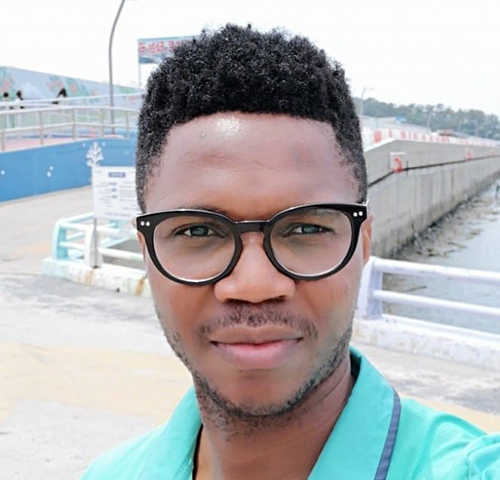
Adekunle Omoniyi
Chemical Engineering PhD student and Indigenous and Black Engineering/Technology (IBET) PhD Fellowship winner
Q: Tell us about your academic background and why you applied for the scholarship.
A: I have a Masters in Chemical Engineering and an MBA. I am here with my family. As a full-time student, it is difficult to pay the bills with only my McMaster University scholarship. I applied for an IBET PhD fellowship at McMaster to obtain funds to supplement my student income to take care of our needs.
Q: What graduate program are you pursuing? Can you tell us about your research and why it matters? What’s the real world impact?
A: I am pursuing a doctorate programme in Chemical Engineering. My research involves the development of polymeric hail resistant roofing. There is lots of damage to roofs during hail storms in Canada and in the US. This shortens the lifetime of the roof, and increases the money spent on repairs and maintenance. Developing roofing materials with significant hail impact resistance will help to extend the service life of roofs, reducing the probability of damage from hailstorms. Consequently, these translate to big savings on the amount spent on roof maintenance and repairs.
My research involves the development of polymeric hail resistant roofing. There is lots of damage to roofs during hail storms in Canada and in the US. This shortens the lifetime of the roof, and increases the money spent on repairs and maintenance.
Q: Why does an award like IBET matter?
A: There are many students out there who are in desperate need of funding for advanced degrees but do not have access to funds. Offering the IBET award gives lifelines to such students.


